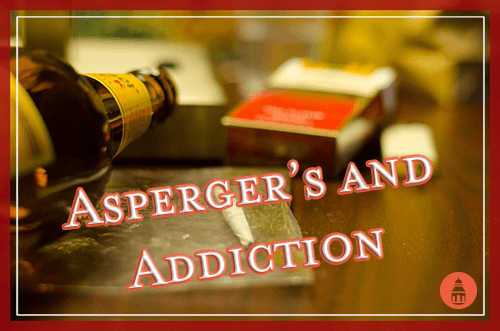In 2013, the National Institute of Mental Health (NIMH) estimated that 18.5 percent of the American adult population (18 and older) suffered from some form of mental illness. NIMH also reports that about 20 percent of children (ages 13-18) will battle mental a mental disorder at some point in life, and around 13 percent of youth (ages 8-15) were diagnosed with a mental health disorder in the past year.
Mental health disorders can affect school, work, and daily life tasks. Asperger’s is a mental health disorder that is on the autism spectrum. It is usually diagnosed in childhood, and it impairs a person’s social interactions.
About one out of every 68 children may be diagnosed with an autism spectrum disorder (ASD), and these disorders are around five times more common in males than in females, according to the Centers for Disease Control and Prevention (CDC).

It may be not as easy to diagnose Asperger’s, or Asperger syndrome (AS), since it may be considered a “mild” form of autism and individuals may be “high functioning.” The National Institute of Health (NIH) estimates that anywhere between 1 in 250 to 1 in 5,000 children may suffer from AS. Asperger’s may also continue into adulthood, although it may be underdiagnosed in this population.
Someone suffering from Asperger’s may appear to be insensitive, have difficulties with nonverbal communication skills such as making eye contact when talking to someone, and may not easily pick up on social cues. They may appear “socially awkward” and therefore have difficulties with interpersonal relationships.
- Social impairment indicated by lack of spontaneous emotions, troubles with nonverbal social behaviors, lack of significant peer relationships, and inappropriate social reactions
- Repetitive and restrictive interest indicated by repetitive motor functions, abnormal obsession restricted to only one or two subjects, routines that seem unnecessary and inflexible, and intense interest in parts of things
- Symptoms impair daily life functioning
- Language delay is not apparent
- Normal cognitive development
The National Alliance on Mental Illness (NAMI) estimates that between 30 and 50 percent of individuals who suffer from mental illness likely abuse substances like drugs or alcohol and vice versa. The connection between addiction and Asperger’s may be complex. Treatment for co-occurring disorders should be comprehensive and integrated to account for the intricacies of both disorders simultaneously.
Connection between Asperger’s and Substance Abuse
An individual suffering from AS may have trouble fitting in with peers due to narrow interests and preoccupation with certain subjects. They may be able to converse for hours on a particular field of interest, but show no ability to engage or include others in the conversation. Speech patterns or inflection may seem “off,” and individuals may speak in a monotone voice. In addition, they may lack enthusiasm for anything other than their chosen interests.
In contrast to typical autism, someone diagnosed with Asperger’s may be inappropriately affectionate and personal contact may be abnormal. For example, a child with AS may hug someone too tightly and at an inopportune time instead of appearing standoffish or aloof like autistic children may appear.
Someone with AS may then be less likely to participate in episodes of problem drinking or drug abuse with a group of friends or peers; however, this disconnect from others may encourage the person to take up drugs or alcohol use when alone, which may contribute to problems with alcohol or drug dependence. A recent study published by Psych Central reported that individuals with autistic tendencies may be more likely to abuse marijuana or alcohol than those who had no such tendencies. Both alcohol and marijuana may provide a sense of calm as well as decrease inhibitions and soothe raw emotions.
Alcohol or drugs may provide a sense of relief, by muting difficult emotions and potentially increasing self-confidence levels temporarily. An individual with ASD may drink or do drugs in order to feel “normal” or in an attempt to fit in with a group. Since Asperger’s is often underdiagnosed, adults may not realize they suffer from the disorder, and illicit substances may become a method of self-medication.
Asperger’s also commonly co-occurs with other disorders like depression, attention deficit hyperactivity disorder (ADHD), anxiety, Tourette syndrome, or obsessive-compulsive disorder, the National Institute of Neurological Disorders and Stroke reports. Co-occurring disorders may increase the risks for substance abuse and dependence. Abusing alcohol or drugs at a young age may interfere with normal brain development involving mood regulation, decision-making, reward processing, and impulse control as well as increasing the likelihood that someone will have a problem with substance abuse or addiction later in life. Genetic vulnerabilities or a family history of addiction may also play a role, as may environmental factors like childhood trauma or neglect.
Regardless of the reason for co-occurring addiction and Asperger’s, symptoms of both disorders are likely to increase the side effects, health risks, and treatment of each disorder.
It’s Never Too Late to Get Help
Treatment for Co-Occurring Disorders

Both Asperger’s and addiction are treatable disorders. A dual diagnosis of co-occurring AS and addiction is best managed by a team of medical, substance abuse, and mental health professionals who work together to integrate a comprehensive care plan that may include both behavioral and pharmacological treatments. When all members of the care team work together and are on the same page, treatment may be more seamless, and both disorders can be managed simultaneously using research-based methods.
When an individual abuses drugs or alcohol for a period of time, a chemical dependency may occur. Medical detox may help to safely remove the illicit substances from the body in a controlled fashion. Medical detox may use medications to manage potential cravings and the possible side effects of withdrawal.
When an individual suffers from co-occurring disorders, medications may be used to treat symptoms of the disorder. The medical team can determine which medications should be avoided during addiction treatment to prevent negative drug interactions. There may be no specific medications for AS; however, depression and anxiety may accompany the disorder and may be managed with antidepressants or anti-anxiety medications. Withdrawal from drugs or alcohol may heighten both depression and anxiety, further highlighting the importance of medical detox during addiction treatment.
Medication may be only one facet of a co-occurring disorder treatment plan, however; therapeutic methods are also important. Occupational therapy and skills training sessions can be helpful in treating autism spectrum disorders in order to help individuals learn how to have positive social interactions and interpersonal relationships. Cognitive Behavioral Therapy may be beneficial in the treatment of both addiction and Asperger’s, as it can help people understand how thoughts and emotions are connected to behaviors and actions. Through group and individual therapy sessions, new coping mechanisms and skills can be taught to incite positive changes.
Art and music therapy may be beneficial during treatment, as creative expression may help to promote self-awareness and work as a positive communication tool and outlet for overwhelming emotions. A healthy diet supported by a balanced nutrition and fitness plan can enhance recovery also.
Families and loved ones may also attend counseling, therapy, and educational sessions to better understand the role of the network surrounding an individual who is struggling with co-occurring disorders. It may be difficult to ascertain exactly how often Asperger’s and addiction may co-occur, but recovery from both disorders is possible. A combination of treatment methods can ensure that individuals and their loved ones can build a healthy path for long-term recovery.
